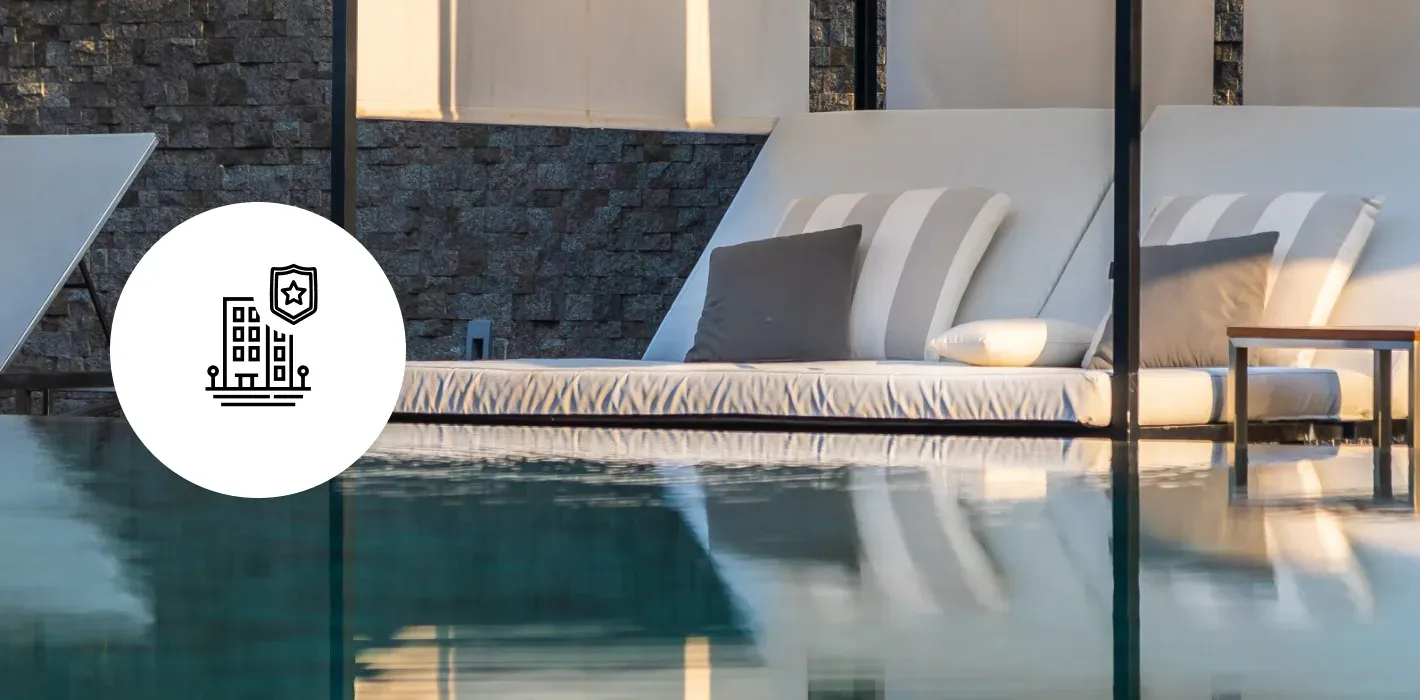

Running a hotel is an interesting venture, yet it involves managing many risks, from property damage and guest injuries to business interruptions and cyber threats.
This is where hotel insurance plays a crucial role. We live in an unpredictable environment, so having the right hotel insurance coverage is not just a necessity but a lifeline for hoteliers.
In this comprehensive guide, we’ll explore hotel insurance, its importance, the risks of operating without proper insurance, how to choose the right policy, and the role of technology in managing hotel insurance.

Hotel insurance is a specialized type of business insurance designed to meet the unique needs and risks of the hospitality industry.
As with any business, the hotel industry involves certain risks, such as property damage, staff and guest injuries, and more.
These incidents can negatively impact your hotel's reputation and lead to expensive and unwanted lawsuits. Having well-designed hotel insurance is the key to protecting your hotel from such risks.
So, depending on these, hotel insurance plans differ between policyholders and are typically made up of a customized bundle to cater to the needs of different types of businesses. These plans cover specific risks such as property damage, liability claims, employee protection, and business interruptions.
Every hotel, regardless of its size or location, needs hotel insurance. Whether you run a cozy bed-and-breakfast or a large resort, having the right insurance coverage is crucial for protecting your business against unforeseen events.
Operating without adequate insurance can lead to significant financial losses. For instance, if a natural disaster damages your property or a guest suffers an injury on-site, the resulting expenses could be substantial.
So, hotel insurance is a safety net, protecting you from incidents and outcomes that risk the financial stability of your business.
Hotel insurance policies are customized to fit the specific needs of each hotel, but common types of coverage include:
| Type of Coverage | Description |
|---|---|
| Property Insurance | Covers damage or loss of physical assets, including buildings, furnishings, and equipment, due to perils like fire, theft, and natural disasters. |
| General Liability Insurance | Protects against claims of bodily injury or property damage that occur on hotel premises. |
| Business Interruption Insurance | Provides coverage for lost income and ongoing expenses if a covered event forces the hotel to close temporarily. |
| Cyber Liability Insurance | Safeguards against data breaches and cyberattacks, which are increasingly common in the digital age. |
| Employers Liability | Essential for hotels with employees, to provide benefits to workers who are injured or become ill due to their jobs. |
| Loss of License Insurance | Protects against losses from having your alcohol license revoked and covers costs incurred when applying to regain it. |
| Flood Insurance | Necessary for hotels located in flood-prone areas to protect against water damage. |
| Event Cancellation Insurance | Useful for hotels that host events like weddings or conferences. |
Consider a scenario where a hotel in a coastal area is forced to close temporarily due to a hurricane. Without business interruption insurance, the hotel would struggle to cover ongoing expenses like staff salaries and utility bills while closed. However, with this coverage, the hotel can maintain financial stability during recovery
Hotels without adequate insurance face a range of risks that can lead to financial instability and operational disruptions:
You may struggle to recover from damage caused by natural disasters, fires, vandalism, or theft. Repairing or replacing damaged infrastructure, furniture, or equipment can be expensive and potentially put your hotel out of business without sufficient coverage.
Hotels are high-traffic areas, and accidents can happen anywhere, anytime. General liability insurance covers guest injuries or property damage claims. Without it, you’ll find yourself facing expensive lawsuits, which may lead to financial strain, reputational damage, and even forced closure in extreme cases.
Business interruption insurance covers hotels for temporary shutdowns in case of fire, water damage, or power outages. Without this coverage, your hotel may have a hard time reopening after a catastrophe because it’d have to pay employee wages, vendor contracts, and running expenses without any source of income.
As you know, a hotel's success relies heavily on technology, making them vulnerable to cyber threats. Data breaches can cause financial losses, reputational damage, and legal consequences. A compromised system could leak sensitive customer data, resulting in lawsuits and loss of customer trust.
Jobs in hospitality usually involve heavy lifting, cleaning, and long-standing hours that can lead to workplace injuries.
Without workers’ compensation insurance, a hotel can face costly medical bills and lawsuits if an employee becomes injured.
Many jurisdictions require hotels to carry specific types of insurance, such as workers' compensation and general liability. Non-compliance with these requirements can lead to hefty fines, penalties, or even suspension of your business.
A lack of adequate coverage can leave you unable to properly address accidents, injuries, or other crises, leading to negative press and bad online reviews. In an era where online reputation can make or break a business, failing to manage risks can negatively impact occupancy rates and revenue.

Identify the particular risk factors for your hotel based on its location, size, and amenities. If you operate a beachfront hotel, you may need more protection from hurricanes, and if you run a hotel with a bar, you'll need liquor liability insurance.
Obtain quotes from various insurers to compare coverage options and premiums. Make sure you are comparing policies with the same limits and exclusions.
Go through policy documents thoroughly to understand what’s included and excluded. Some policies may exclude certain natural disasters or specific types of liability.
An insurance broker that focuses on the hospitality industry will be able to provide insight and potentially tailor a policy to suit your specific situation.
Your insurance needs may change as your hotel grows or adds new services. Review and update your policy regularly to ensure continuous, adequate coverage.
Technology is doing more than improving efficiency—it’s transforming the entire process. You can use AI to predict potential risks and IoT devices to monitor your properties in real time. These tools help you manage insurance more effectively by improving risk assessment, reducing losses, and simplifying operations.
With technology, you can handle insurance matters with greater clarity, speed, and confidence.
| Technology | Description | Use Case |
|---|---|---|
| AI and Data Analytics | Uses artificial intelligence and big data to identify and assess potential risks. | Helps hotels and insurers predict issues and create personalized policies. |
| Online Policy Management Platforms | Digital platforms provided by insurers to manage policies, claims, and renewals online. | Reduces administrative work and provides easy access to insurance details. |
| IoT (Internet of Things) | Smart sensors detect risks like leaks, fire hazards, or unauthorized access in real time. | Alerts hotel staff to issues before they cause major damage. |
| Cybersecurity Solutions | Tools and insurance coverage designed to protect hotel systems and guest data from cyber threats. | Mitigates the impact of cyberattacks and secures sensitive guest information. |
Hotel insurance is a crucial safeguard against the hospitality industry's financial, legal, and operational risks.
Whether recovering from property damage, dealing with guest liabilities, protecting yourself from cyber threats, or bearing the weight of business interruptions, the right insurance coverage can mean the difference between resilience and financial ruin.
With proper risk assessment, policy comparison, technological help, and effective industry collaboration, you can ensure you have the ideal policy coverage for your hospitality business. Protecting your property becomes imperative, so investing in a hotel insurance policy is vital for the long-term viability of your business.
Hotel insurance is a specific type of insurance that provides financial coverage for hotels in case of liabilities, natural disasters, staff or guest injuries, and more.
There is no fixed price for hotel insurance; it varies depending on factors such as the insurance provider you choose, the size of your hotel, and its specific needs.
Property insurance protects hotels by covering the physical assets of the establishment, including buildings, furniture, and equipment, against damages or losses caused by such events as fire, theft, vandalism, or natural disasters. This coverage ensures that hotels recover financially and maintain operations without significant interruptions following unforeseen incidents.
Business interruption insurance for hotels is designed to protect against financial losses when unforeseen events, such as natural disasters or fires, force a temporary closure. This type of insurance covers lost income and ongoing expenses, helping hotels maintain financial stability during the recovery period.
Hotels can implement comprehensive safety protocols, maintain well-documented records of incidents, and ensure compliance with legal standards such as premises liability and ADA requirements. These can help against guest lawsuits.
Increasing costs due to increased claims and natural disasters, a focus on cybersecurity threats, and technology integration for more customized and efficient risk management are among the latest trends in hotel insurance coverage.
Founder / CEO
Andranik is the CEO and Co-Founder of inoRain OTT and the Co-Founder of HotelSmarters, specializing in next-generation streaming technologies and digital transformation for the hospitality sector. He focuses on building innovative, scalable solutions for video delivery, OTT monetization, and data-driven hospitality management. His work bridges technical sophistication with practical business impact, helping organizations modernize their digital ecosystems and improve operational efficiency.